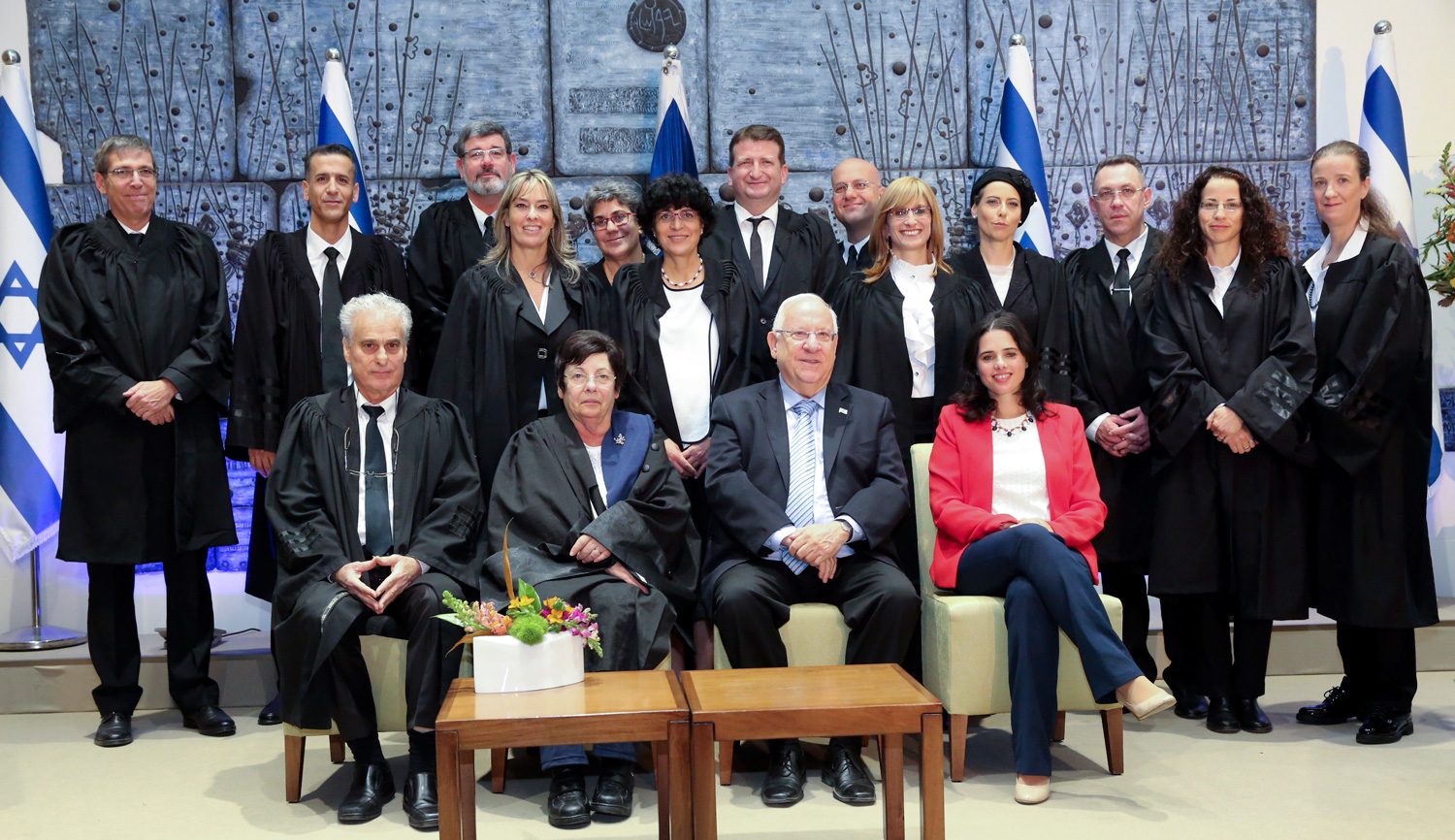 A swearing-in ceremony for newly appointed judges at the Israeli president’s residence in Jerusalem on December 8, 2016. Yossi Zamir/Flash90
A swearing-in ceremony for newly appointed judges at the Israeli president’s residence in Jerusalem on December 8, 2016. Yossi Zamir/Flash90 U.S.
David Ignatius takes a look at the decision President Trump faces in Syria:
The dilemma is eerily like what President Barack Obama faced in Iraq in 2011, and the risks and benefits are similar. President Trump, like his predecessor, has expressed skepticism about permanent U.S. wars in the Middle East. But he also knows that pulling out U.S. troops from bases east of the Euphrates could create a vacuum that might trigger ethnic slaughter, regional proxy wars and a new wave of jihadist violence.
Shadi Hamid explains (in a conversation with Daniel Marans) what studying populist movements in the Middle East has taught him about Trump’s appeal:
“Our starting point as observers shouldn’t be, why did people vote for Trump? It should be, why did members of the so-called white working class ― why wouldn’t they vote for Trump? Because Trump offers them a sense of meaning, a sense of belonging, that their lives were exciting, that there was something to fight for again ― and that’s a very natural human impulse,” Hamid said.
The Democratic Party’s brand of non-racist, center-left technocracy simply does not have a similar hold on people, Hamid observed.
Israel
Avi Issacharoff makes some grim predictions about how Israel might soon have to deal with Iranian aggression at its gates:
Unless something changes, Israel is sprinting headlong into another violent confrontation along its northern border, this time against either Iranian troops or Iranian backed fighters with missiles made to order from Tehran… The disappearance of the Islamic State from wide swaths of Syria, together with the superpowers’ lack of interest (or desire) in removing Syrian President Bashar Assad from power, are paving the way for an Iranian takeover of the territories until recently held by the jihadist group.
Einav Schiff examines the Israeli public’s waning support for the country’s High Court:
And so, the High Court has been left on its own, operating on the fumes left of what was once collective consensus. “The people” are growing tired of the court, or at least that is what some of their more prominent representatives are saying.
The view of the court as an ivory tower, home to self-appointed gods, is becoming more and more common, and this is reflected in different confidence indexes. Last May, for example, the Rule of Law Index by Prof. Arie Ratner of Haifa University found that 49 percent of Jewish Israeli citizens have confidence in the Supreme Court. In 2000, that rate stood at 80 percent. This isn’t a slip or a drop, it’s a collapse.
Middle East
Kori Schake believes that there are legitimate reasons for hope in post-ISIS Iraq:
One could be forgiven for thinking Iraq remains a tangled mess of sectarian division and political failings, whose people are incapable of resolving their differences and working together to rebuild the country. Those who believe the people of the Middle East unsuited to democracy may even take satisfaction their bias has been borne out by events. That is not what I saw in Iraq.
Pinar Tremblay writes about Erdogan’s biggest political weak spot, Istanbul:
In the midst of all the difficulty lies an opportunity for the opposition. Erdogan’s passion and fear of losing Istanbul should be telling for the opposition groups, which have a chance to claim the powerful position of mayor. If the opposition can deliver some relief to Istanbul, prove itself effective in governance and rally first-time voters to the polls in March 2019, it could have a chance to directly challenge Erdogan for the presidency in November 2019. Indeed, this might be the only possible peaceful method to keep Turkey from quickly slithering into tyranny.
Jewish world
Marjorie Ingall has suggestions on how to introduce Labour Day to Jewish children:
Look, no matter how old your kid is, you can explain Labor Day in a sentence: Back in the late 1800s, many Americans had to work 12 hours a day, seven days a week—kids, too!—in unsafe conditions, without enough bathroom breaks, until groups of workers banded together in unions and helped advocate for better conditions. Feel free to add that Jews were a huge part of this movement, and as part of our ongoing efforts at tikkun olam (fixing the world), we should continue to advocate for workers still being exploited in America (holla, Walmart!, hey there, Amazon!) and in other countries.
Amy Oringel tries to find out why more and more Jews are deciding to study in the Deep South:
Ahhh college. The relaxing campus quad. The funky all-night coffeehouses. The magnolia trees filling the humid air with sweetness.
Wait a minute. Don’t most Jews equate the college experience with shuffling past ivy-covered buildings in heavy sweaters? No longer. The numbers of Jewish students attending southern colleges has been sharply on the rise. Pockets of the country that just years ago might have seemed off-limits to Jewish families are now getting a whole lot more popular.























 More news and opinions than at a Shabbat dinner, right in your inbox.
More news and opinions than at a Shabbat dinner, right in your inbox.